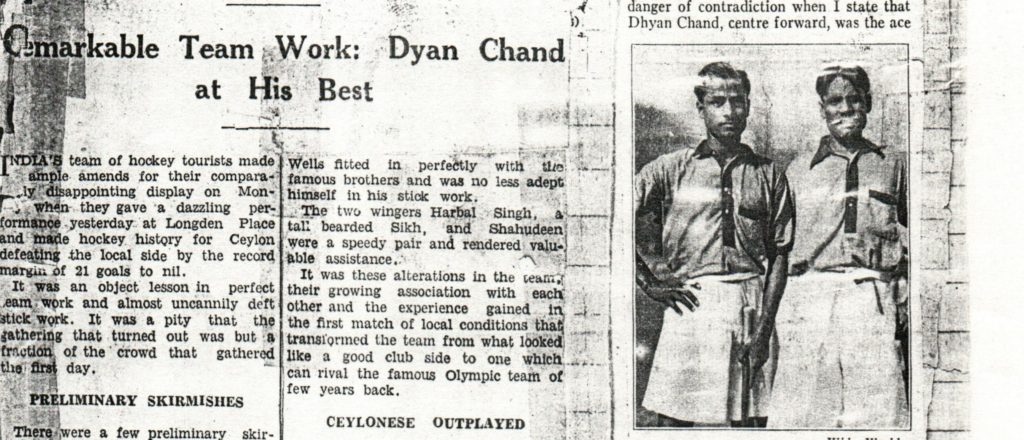This was a wizard with a difference. His wand was a hockey stick with which he mesmerized all the world over.
Born on August 29, 1905, in Allahabad, Dhyan Chand’s skills blossomed in the British Indian Army which he joined as a 16-year-old. He scintillated in numerous events from 1922 to 1926 and his passion for the game knew no end.
His obsession with the art and craft of hockey saw him practice under moonlight thereby earning the name ‘Chand’.
Not surprisingly, Dhyan Chand made rapid progress and moved up the ranks in the game. He duly made the Indian Army team on tour of New Zealand in 1926 – a campaign of high significance not just for his playing career but for the future of Indian and indeed world hockey.

Dhyan Chand lives in the hearts of India
The Indian Army side captivated fans in New Zealand as they won 18 matches, drew two and lost just one on their tour. At the centre of the Indian juggernaut was Dhyan Chand and it was just the beginning of the legend whose international career spanned more than 21 years.
He was promoted to Lance Naik in the Punjab Regiment, eventually to rise to Major and on the pitch his sublime skills and prowess drew fans in droves. Dhyan Chand was the cynosure of all eyes and with the 1928 Amsterdam Olympics beckoning, the stage was set for the ‘Wizard’ to parade his skills on a world stage.
Hockey was re-instated into the Games after being dropped at the 1924 Paris Olympics and the Indian Hockey Federation was keen to send a quality team to the Netherlands.
Dhyan Chand turned out for UP after the Army teams pulled out of the inaugural National Championship and, needless to say, made an indelible mark in a field that included Punjab, Bengal, Rajputana, United Provinces (UP) and Central Provinces.
As centre-forward, Dhyan Chand enthralled one and all with his skills, energy and immaculate ball control that destroyed and demoralized defences. He was quite simply an automatic choice in India’s first ever squad to the Olympics.
History was written in letters of gold as Dhyan Chand lead the scorers’ list with 14 goals in five matches as India strode to the winners podium in style after taming hosts Netherlands 3-0 in the final.
There was no respite for opponents as the Wizard’s legend grew and four years later at Los Angeles 1932, he was again the driving force of India’s campaign to retain the gold medal. He had, however, his brother Roop Singh for company as India decimated the three-team field with scores of 24-1 over hosts USA and 11-1 over Japan.
Playing in his third Olympics, Dhyan Chand captained India to a hat-trick of gold medals achieved in style with a 8-1 win over hosts Germany in the final of the 1936 Berlin Olympics.
The Second World War wiped out sporting activity for a decade and when peace returned Dhyan Chand, now in his forties, was still good enough to set hockey turfs afire.
He was named captain of the Indian team to tour East Africa in 1947-48 during which he scored 61 goals in 22 matches. Dhyan Chand then phased himself out of top level hockey, eventually retiring in 1948.
He was conferred the Padma Bhushan — the third-highest civilian award in India – that year and made the expected move to coaching eventually taking charge of the National Institute of Sports, Patiala.
Dhyan Chand passed away on 3 December, 1979, aged 74, leaving behind a rich legacy which lives on to this day. His birth anniversary on August 29 has been declared National Sports Day in India and several stadiums in the country – notably the National Stadium in New Delhi – bears his name.

